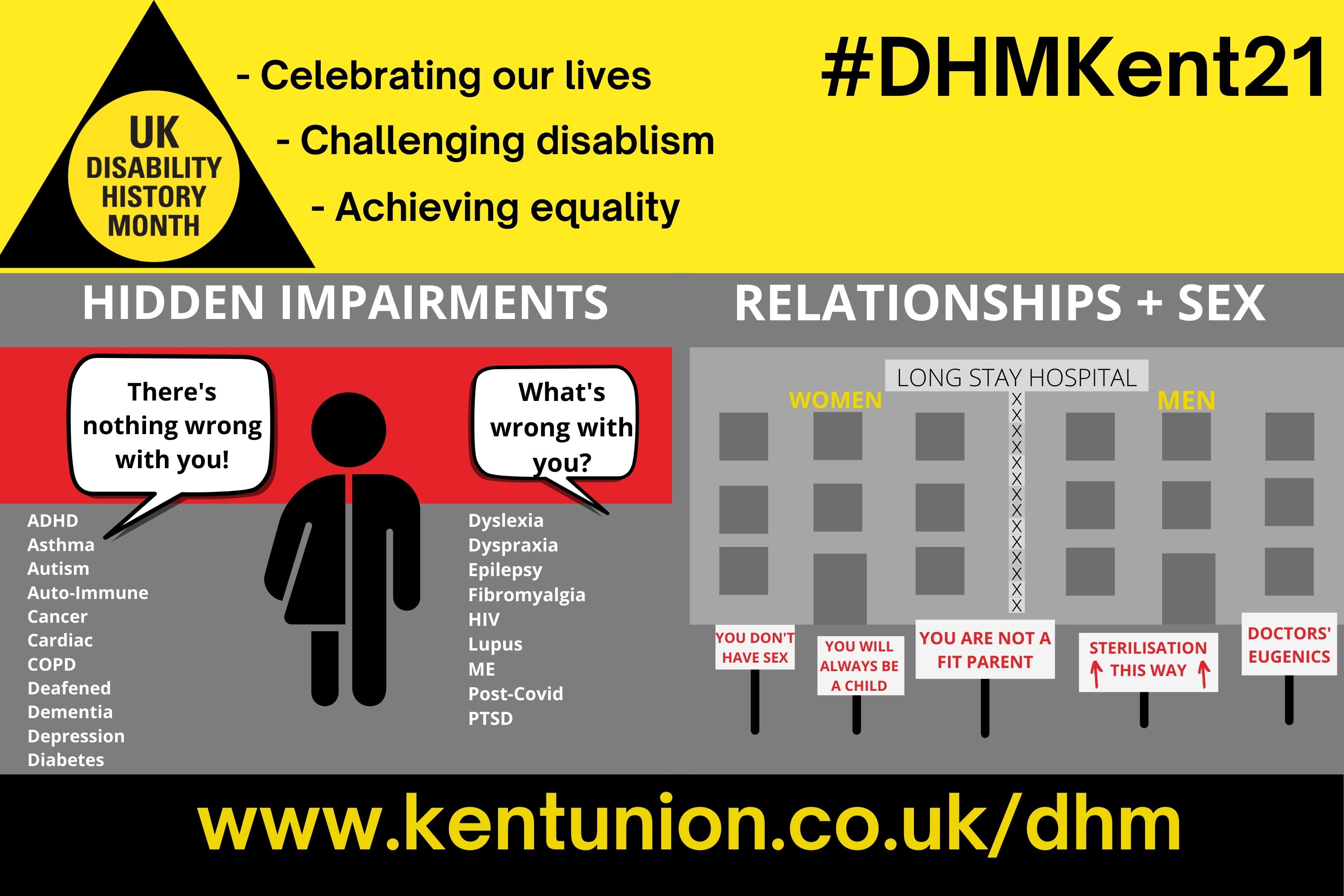Information on this year’s national themes, and what is happening at Kent that you can participate in over the next month.
What is Disability History Month?
Disability History Month is a yearly nationwide celebration from 18 November to 18 December, which was started to shine a spotlight on historical and current achievements and issues to do with disability.
UKDHM is the national organisation which strives to celebrate the lives of disabled people; challenge disablism or stigma around disability; and achieve equality. This year two themes were chosen: Disability, Sex and Relationships, and Disability and Hidden Impairments. UKDHM adheres to the social model of disability, in which the barriers of attitude, environment and organisation cause most of the disablism people face. At Kent we actively work to remove those barriers to create a more inclusive and accessible environment for everyone, and there is expert support for students with disabilities at Student Support and Wellbeing.
Disability, Sex and Relationships
For millennia, people with disabilities, both visible and invisible, have been de-sexualised, viewed as perpetual children, actively discouraged from forming adult relationships and, horrifyingly, sometimes actively segregated in single-sex institutions or forcibly sterilised. Thankfully, in the UK today all children, regardless of disability status, are entitled to sex and relationship education and action is taking place to break down previously held stigmas about sex in relation to disability.
Disability and Hidden Impairments
More than half the 13.5 million people currently identified as disabled in the UK have hidden impairments – which means many staff and students in our Kent community too. What’s a hidden impairment? This could be many very common physical conditions which you can’t immediately see, such as chronic pain, irritable bowel syndrome, migraines, heart conditions, diabetes, hearing or visual impairments. It could also be cognitive or neurological impairments such as specific learning difficulty like dyslexia, dyspraxia; neurodivergence, or mental health conditions such as anxiety, depression, post traumatic stress disorder, bipolar or schizophrenia.
Any of these ‘invisible’ conditions, whether temporary or permanent, can alter the way a person lives, works, studies and socialises, and being aware of the ways in which we can adapt to one another’s needs will help us create a more inclusive environment, in which everyone is respected, valued and equal.
DHM at Kent
As part of our work this month, we want to shine a spotlight on some of these challenging conversations about hidden disabilities and disability, sex and relationships, looking at where we have progressed but also where there is still work to be done in our own communities. We have developed an exciting programme of activity for all staff and students to engage with, both online and in person at our Canterbury and Medway sites. The University of Kent and Kent Union are proud to collaborate to raise awareness of the issues people with visible and invisible disabilities face today, and share ideas and opinions both within our community and the wider community to educate, de-stigmatise, and work together for a more inclusive and equal society.
The full programme is available on the Kent Union website, and some key highlights include: A virtual exhibition, consisting of TED Talks, documentaries and recommended films that explore the themes of the month which you can look through in your own time, or plan to read, listen to or watch with friends; workshops delivered by Mind Facility; Accessible Film Club screenings; Staff and Student sessions on support mechanisms for people with hidden disabilities; Accessible sport sessions.
We hope you enjoy the programme and that you use it as a starting point for deeper thought and conversations with your friends and colleagues. Follow #DHMKent21 on social media for the latest, and if you would like to contribute your experience and perspective to conversations, podcasts or articles on this theme during the month, please email StudentServicesWeb@kent.ac.uk.
Written by Natalia Crisanti and Becky Lamyman, 18.11.21
